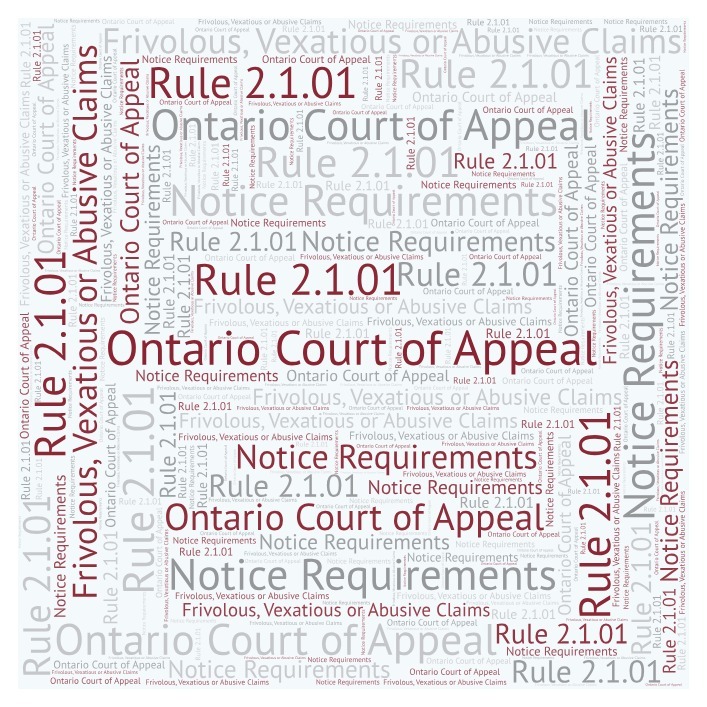The Ontario Rules of Civil Procedure provide a mechanism for addressing occasions where a litigant advances a claim that is frivolous, vexatious or otherwise an abuse of process. Pursuant to Rule 2.1.01(1), “the court may, on its own initiative, stay or dismiss a proceeding if the proceeding appears on its face to be frivolous or vexatious or otherwise an abuse of process of the court.”
In the case of Van Sluytman v Muskoka (District Municipality) (Van Sluytman v Muskoka (District Municipality), 2018 ONCA 32), the Ontario Court of Appeal addressed eight appeals. Seven of the appeals related to orders dismissing actions brought by the appellant, Mr. Van Sluytman, on the basis that the actions were frivolous or vexatious, pursuant to Rule 2.1.01(1). The eighth was an appeal of an order declaring Mr. Van Sluytman a vexatious litigant.
One of the grounds for appeal asserted by the appellant was that the application judge erred in dismissing his actions in light of the absence of any notice as required by Rule 2.1.01(3). Rule 2.1.01(3) sets out the procedure by which the court may make a determination under Rule 2.1.01(1). Rule 2.1.01(3) requires that, unless the court orders otherwise, the court shall direct the registrar to give notice that the court is considering making the order under Rule 2.1.01(1). The plaintiff or applicant may file a written submission to the court within 15 days after receiving the notice.
The court ultimately dismissed the appeal. While acknowledging that it was “not entirely clear that notice was given in all seven actions” the court found that the notice requirement under Rule 2.1.01(3) was satisfied on the basis that the actions were being managed together and that “notice was directed to be given and was given in at least some of the actions.” Further, the appellant appeared in person and provided written submissions. The court went on to note that “even if the appellant did not receive notice under R. 2.1.01 to make submissions, no prejudice or injustice arose as the outcome would be unaffected. It is apparent on the face of each statement of claim that the actions are frivolous and vexatious and an abuse of process.”
The court’s decision is interesting because it recognizes that the notice requirement in Rule 2.1.01(3) can be dispensed with if a claim is so clearly frivolous and vexatious that there is no argument available to the plaintiff that could persuade the court not to dismiss the action. Was that the court’s intention? Is it now open for a requesting party to seek the application of Rule 2.1.01 on an ex parte basis in the clearest of cases? Perhaps yes, as the Rule itself anticipates instances where the court may determine it appropriate to dispense with the procedure set out in Rule 2.1.01(3) (“unless the court orders otherwise…”). Ultimately, time will tell as this relatively new Rule continues to be applied.
Shauna Cant is a member of the Commercial Litigation team. She can be reached at 613-369-0359 or at shauna.cant@mannlawyers.com.







